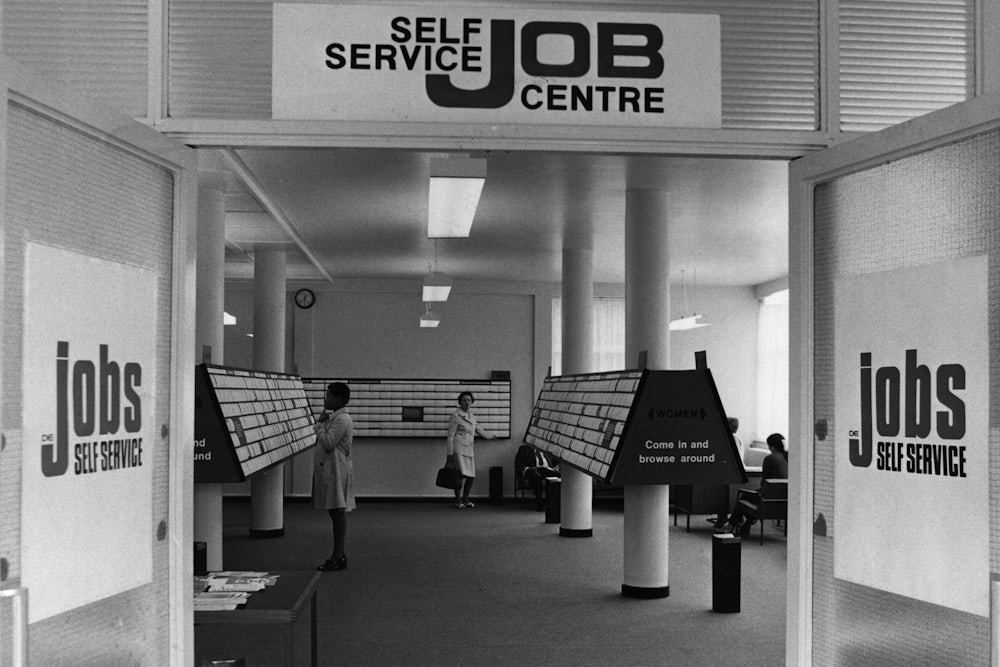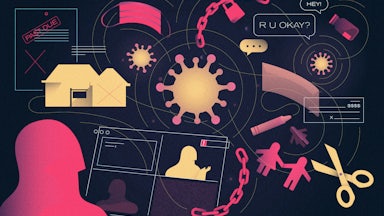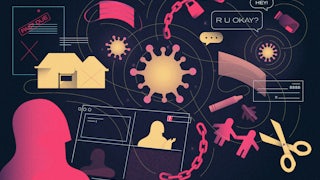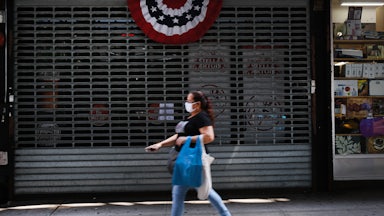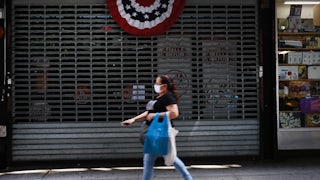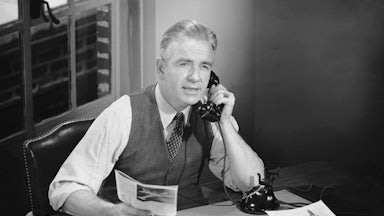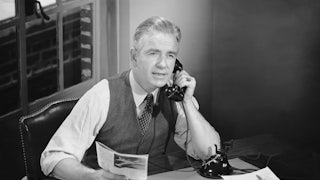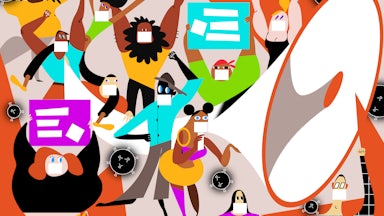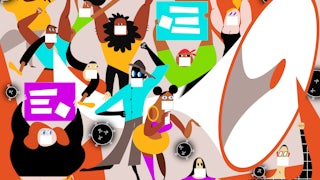Nearly a year into the pandemic, more than 10 million people are out of work in the United States. That number is partial, excluding the seven million people who are unemployed but have simply stopped looking and the millions more who are underemployed—having some work but not enough to get by.
The crisis of work in this country is only partly a crisis of the conditions of our labor. The fuller story is about how much else is dictated by work or its absence. Millions of people lost their health insurance as a consequence of losing their jobs or losing their full-time hours. Others lost visas. No job means back rent, mounting credit card debt, overdue utilities with looming shutoffs, no gas in the tank. These are fragile little houses we are all asked to live in.
Work sucks when you’ve got it. It can suck more when you don’t. These are some stories of that particular bind.
Before the pandemic, I was a server at an Irish pub. During a pre-shift meeting with management, the restaurant staff all learned we were being laid off the day before St. Patrick’s Day, which we’d all been preparing for as the busiest night of the year, since servers typically made four times more on St. Patty’s than a normal shift.
I didn’t have health insurance and remember feeling, before the shutdown but when Covid was already in the U.S., this constant sense of worry that I’d touch the wrong person’s fork or otherwise get sick.
Getting unemployment is an ongoing struggle. I applied in April and was approved for a measly $98 a week in May. But I never got the check. Nothing from the supplemental unemployment, either. Thankfully, my spouse has a job that allows her to work remotely, so we manage to keep our rent and bills paid. But if it weren’t for her job, we definitely would’ve been evicted by now. My restaurant has since reopened, but I’m not about to risk my health and safety, not to mention my spouse’s health and safety, for $2.13 an hour plus tips. People should be paid to stay home, and businesses should be paid to stay closed.
I was furloughed from my job as a flight attendant in October. At first, it was really hard to know what to do. Should I be looking for an alternative career? Should I be waiting [for] a new stimulus bill or stand-alone legislation? It was an emotional roller-coaster. My union was a support through all of it, but we felt abandoned by the people representing us in Congress.
Things had been hard before that, too. Flying during a pandemic was scary. Essential workers like us still had to report for duty. You hear stories about doctors or medical workers sleeping in their garages, who haven’t had any contact with their families because they didn’t want to get anyone sick; it was the same for us. My parents are about 70 and live a few miles down the road. I didn’t see them for many months.
I lost my job twice, actually—the first time in May, then again in October after I found another job. Both were pandemic layoffs. I lost my immigration status both times because my visa was sponsored through my former employers.
Practically speaking, the whole thing was a logistical nightmare. In order to get my visa after getting the job offer, I had to leave the country to go to a consulate outside the United States. That was scary—flights were expensive, virus cases were high—but I had no choice but to go. I took every precaution I could think of, but still ended up getting Covid on that trip. I was actually still sick when my new employer told me that my job had been eliminated. Another layoff. By that point, I had run through a lot of my savings and was feeling incredibly anxious about my ability to even stay in the U.S.
As a noncitizen, I wasn’t eligible for unemployment through any of this. I am so lucky I had savings. If I hadn’t, I don’t know what I would have done. On another level, it has been so destabilizing to have work be such a core part of your identity and then to lose that. The pandemic showed me how little control I really had over certain things—my job, my finances, where I lived.
I was laid off on March 24, along with most of my co-workers. I was working in the main office of an insurance sales company. After weeks of pretending the virus wasn’t a threat—and the company president even saying certain news channels were exaggerating—we were pulled into the meeting room and told that we were being temporarily laid off.
I was assured that we would be hired back, whether in a few weeks or a couple months. While laid off, we received weekly updates from the company: videos of the president and CEO displaying optimism and boasting about how impressive the sales numbers were despite the pandemic. In July, those emails stopped. At the end of July, we all received a letter letting us know that we wouldn’t be brought back on. I am still unemployed.
I worked as a security guard and was furloughed at the beginning of the pandemic, once all the major event spaces started shutting down. I have been unemployed ever since. I’ve been trying to support myself through freelance work, relief funds, and kind donations from friends and peers. My job paid $20.61 an hour, after five years in the union. This year would have marked my sixth year working there.
I worked for a full-service corporate meetings and events agency, mainly focused on venue sourcing and hotel selection for large in-person meetings, events, and conferences—anywhere from 10 to 1,000 people. You can imagine the negative effects of the pandemic.
I was furloughed in April. First for three months, then an additional three months as the pandemic showed no sign of slowing. Ultimately, we were offered the option of taking severance, six months of unpaid leave, or the status quo of letting the furlough expire. I chose that option—letting my furlough expire—so I could collect unemployment. I was given the option to enroll in Cobra, but I took the risk of not having insurance in the middle of a pandemic. The first three months that I was on unemployment were easier because of the $600 weekly federal supplement. However, once that additional help expired, my state unemployment was substantially lower.
I was unemployed for eight months and one day before landing a new job. During that time, I applied to hundreds of jobs and edited or tailored my résumé and cover letter numerous times. It proved to be the most challenging job search of my life, often feeling hopeless with the number of rejections and nonresponses from companies.
The eight months that I was furloughed and unemployed were the most challenging of my life. I feel excited and ready for my new job, but this experience has changed my perspective on life generally. How could it not?
At the start of last year, I worked at a community gym and recreation center. I was the office manager. When our governor imposed a shutdown in mid-March, I was told not to come back into work the next day.
Around mid-June, I got a call from the H.R. director and CEO of our branch, and they told me I was going to be laid off—that my job wasn’t coming back. Fine. I sort of expected that. But two days later, I got a call from my director asking me to come back part-time. (In the interim, I went to the E.R. with a stomach ulcer. I was on the hook for $12,000 because I no longer had insurance through work.)
Once I was back at work part-time, we saw a massive reduction in people coming in. That meant less income. Then I started showing symptoms of Covid, so I stayed away because I didn’t want to be the one to cause an outbreak or a shutdown. It’s been months now, and I’m still in an ambiguous place—technically I haven’t been fired, but I’m also not working. I have no idea what comes next.
I was an assistant manager in a coffee shop. I lost my job mid-March and have been unemployed since then. I didn’t lose any benefits because I couldn’t afford the health care in the first place. I’ve been fortunate enough to be supported by my wife, who got a decent raise just as I was let go. I was also eligible for unemployment and started making significantly more money than I did when I was working.
I am still out of work, but I now spend 30 to 40 hours a week doing mutual aid. I’ve helped organize marches, helped establish a local “free store,” weekly hot meals, and a bail fund that’s freed a number of people from pretrial detention. Spent more time reading and writing music. The eventuality of heading back to work looms over me and, honestly, I’m not sure if I can actually see myself doing it.
Lost my job in hospitality the third week of March, when shit started hitting the fan. The H.R. person came into my office and explained I was being let go due to the “current economic conditions.” My boss was MIA during this, and I was never given any warning. I had another job at the time but was on medical leave due to an injury that prevented me from doing lifting and working on my feet. Losing my primary job meant losing my health insurance and about 70 percent of my income. The only money I was making was through weekly workers’ comp checks that were a little more than $200 a week. It forced my parents to each pick up another job, as I was paying rent for them. Pandemic also delayed the surgery I needed, as it was deemed nonessential, so I couldn’t return to my secondary job until I had it and recovered, which wasn’t until late July. I never received unemployment benefits because my state denied my claims and numerous appeals due to a narrow reading of the law that disqualifies workers on a leave of absence.
I’m just now back, mostly full-time, at what used to be my secondary job. I still don’t have insurance, though. The plans available through the Affordable Care Act are completely unaffordable and unrealistic. It’s just a terrible, cold system. It’s radicalized me.
I came to the United States from Turkey in 1994 on a student visa, chasing the American dream. I overstayed my visa and lived undocumented for a number of years before regularizing my status. At first, I worked retail jobs and drove a yellow cab. Before the pandemic, I was working as an Uber driver. As fares dried up in April, during the early shutdowns, I started selling produce full-time as a street vendor. Around the same time, my wife was furloughed and started collecting unemployment. But I like working at the produce stand. In addition to the extra income, I’m getting older and appreciate being on my feet.
I lost my job in March of the pandemic. I was working 40 hours a week as a physical therapist. I started working again in September, but it’s just two days a week now. I’ve applied for other things, but it’s been a handful of interviews that went nowhere. Some interviewers tell me they’ve never had more qualified applications; some hospitals have hiring freezes. I don’t have any insurance or benefits through my current work, but have been able to keep my emergency Medicaid during the pandemic. My car, which I use to get to work, is falling apart, but I can’t afford to fix it—all major expenses are out right now.
